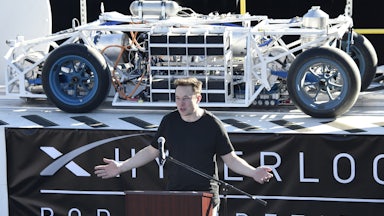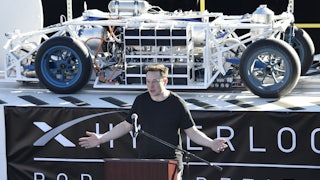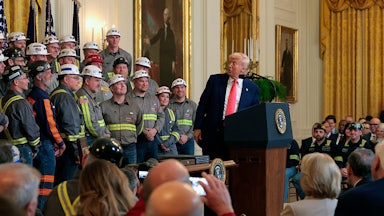It’s almost become a cliche, the many signs that waste is slowly killing us.
The footprints are everywhere: from the leaky pipelines and cargo trains that unleash toxic plumes above Ohio one month to explosive chemicals mysteriously disappearing across Western plains the next. Countless communities’ groundwater has been poisoned by “forever chemicals” in firefighting foam and corroding gas station storage tanks. Microplastics have been found in everything from kale, to human breastmilk, to sea creatures at the bottom of the Mariana Trench. Perhaps our most damning waste legacy is the carbon emissions that have unleashed extreme weather patterns and species loss. And yet, at this rate, it’s hard to tell if we’ve seen the worst of our garbage crisis.
A half-century after the birth of modern environmentalism, cleaning up all of our trash remains an elusive proposition. Despite the seemingly everyday disasters on the news, we’re rarely aware of the mass totality of all of our waste—of the colossal amounts of damaging stuff we’ve created and foisted on the planet. A steady flow of evidence points to the second-order impacts and long-term consequences of pollution, from increased cancer rates and organ damage to endocrine disruption and low fertility.
But rather than face hard truths about reorganizing our system to stop waste, policymakers and citizens are falling victim to another pernicious threat: empty and inefficient promises from the tech industry. Over the past decade, the sector has taken off in trying to provide cleanup solutions while doing little to actually stem the tide of garbage. Last year alone, venture capitalists invested over $6 billion into waste management startups.
These new ventures can take a myriad of forms. Companies like Loop and Again, for example, are trying to jumpstart consumer demand for reusable packaging by recreating an archaic technology: the glass or aluminum container once provided by the milkman. Advanced recycling startups, meanwhile, are forging new markets for lithium-ion batteries and food waste; one product claims to convert general household waste into “sustainable plastic” feedstock. Even more companies are looking to biology, identifying bacteria or plants and fungi that can absorb petrochemicals and harmful metals. Founders pledge not only a solution to a waste problem, but also hefty returns for investors.
“There’s been a huge boom in research on ways to clean up all sorts of materials, from single-use plastics to wind turbines,” professor Julie Rorrer said in a recent MIT Technology Review article. “There’s valuable things in trash.”
While these companies may make money in the short term, few cleanup ventures offer good-faith or coherent solutions for our planet. Successful prototypes capture a mere fraction of the growing volume of pollution unleashed each year. It’s a constant game of catchup—with enormous expenses.
Take ocean plastic, which is arguably one of the most visible forms of waste over the past decade. Growing public awareness of plastic’s hidden costs—illustrated by heartbreaking images of remote coastlines littered with mountains of trash, or the stomachs of dead seabirds protruding with bottle caps and toothbrushes—have inspired a wave of bans on specific items like straws and takeaway bags in recent years. But today, we produce more single-use plastic than ever, and shed roughly 11 million tons of plastic waste into the ocean each year. The global economy is on track to triple this annual output by 2060, buoyed in part by Big Oil’s turn to fossil-fuelled plastics production as a hedge against electrification.
One self-styled “solution” for plastic waste has won outsized influence. In 2012, Dutch teenager Boyan Slat presented a TED Talk on his concept for cleaning up the ocean with simple mechanisms to sweep up all the trash. While scientists and plastics experts cautioned that his ideas were ineffective, Slat’s non-profit the Ocean Cleanup, founded the year after his talk went viral, has gained millions of followers and big-name backers, including Salesforce, Maersk, KIA, and PayPal’s Peter Thiel. But the venture had one major problem: its first two designs didn’t work, despite the group burning through tens of millions of dollars over the course of a decade. The Ocean Cleanup has since pivoted to work with upstream river “interceptors” that are much more efficient at capturing garbage, but its website still prominently features its latest ocean debris “solution”—essentially a trawl fishing net dragged between two boats that has, to date, collected a comparatively miniscule amount of trash.
Tech projects like these are more of a curse than a blessing. Even if the Ocean Cleanup one day somehow beats the insurmountable odds and removes all surface-level traces of plastic marine pollution, it’d still be missing the vast majority of waste that sinks to the bottom of the ocean floor, or breaks up into tiny microplastics. While companies like these bring increased attention to the plastics crisis, they’re ultimately flashy gimmicks that lull our public consciousness into thinking a clever gadget can solve a collective-action problem. These projects also allow consumer brands—like Coca-Cola, an official “Global Implementation Partner” of Slat’s group—to greenwash their continued massive plastic production, while lobbying behind-the-scenes against regulations that would actually help the world break its plastic addiction.
“We now know that we can’t start to reduce plastic pollution without a reduction of production,” environmental scientists Imari Walker-Franklin and Jenna Jambeck write in the introduction to their forthcoming study, Plastics. To meaningfully address this crisis and others like it, we need to look upstream, invest in reuse infrastructure, and mandate biodegradable packaging and high material recyclability. At a minimum, we need to start making producers bear the cost for the collection and disposal of their poorly designed goods.
Unfortunately, there’s now a plethora of cleanup ventures clouding our better judgement. Miles above our plastic-filled oceans, a crowded wasteland of man-made debris now orbits the Earth. For decades, aerospace companies have shed defunct rocket launchers, abandoned satellites, and millions of stray pieces of machinery that can circulate almost indefinitely in orbit around our planet. Today’s private space ventures are set to increase the number of active satellites tenfold by 2030, even as experts warn about the persistence of space junk and increasing collision risk. Some believe we could soon see a catastrophic chain reaction that renders low-earth orbit unusable, jeopardizing the cosmic infrastructure that undergirds modern life, from GPS and weather monitoring to digital payments. But rather than curtail deployment, or embrace even modest end-of-life guidelines for spacecraft, the industry’s leaders are addressing the trash problem in the silliest ways possible: VCs have invested tens of millions into cleanup ventures that use lasers, spider webs, and harpoons to capture space debris.
Our cleanup delusion extends to the grandest environmental stage possible. One of greentech’s hottest sectors is carbon removal, a kind of cleanup for fossil fuel emissions. While the UN’s climate science body asserts that carbon removal is “essential” to curbing catastrophic warming, the question is just how much we’re going to need. If the world immediately begins cutting back its fossil fuel use, we may only need to employ expensive carbon removal technologies sparingly. But instead of focusing on regulations to curb emissions at a fraction of the cost, governments and giant corporations alike have begun funneling billions into various “solutions” to suck carbon dioxide from the atmosphere. Accordingly, tech ventures developing massively expensive carbon capture technologies—technologies which may never turn a profit or be truly scalable—have begun pitching themselves as climate saviors, relying on the high end of those UN estimates to make their case. The cycle becomes never-ending: the longer we wait to crack down on pollution, the more trillions in capital, and megatonnes of net-new emissions, we must spend to build an unproven infrastructure—one that may never even deliver the promised returns for its investors.
For polluters, cleanup technology not only offers a way to preserve the status quo, but also unlock new revenue streams. Some of the buzziest space cleanup ventures were founded by former SpaceX and Boeing executives. Nearly every oil company has embraced carbon sequestration, thanks in part to expanded tax credits and subsidies folded into the 2022 Inflation Reduction Act. “Emitters are recognizing the former trash they were emitting into the air is now a treasure,” carbon-capture CEO Charles Fridge told Politico. “It was previously something they were ashamed of, a byproduct. Now it’s a currency.” Today’s industrial tycoons get to rack up untold profits while making an obscene mess, then turn yet another buck feigning to clean it all up. Call it the Cleanup Industrial Complex.
Worryingly, our societal obsession over waste’s obvious consumer forms helps corporations to get away with massive industrial breaches. In the U.S., plants regularly break E.P.A. emissions rules in favor of paying fines as a cost of doing business. For years, BP’s Whiting refinery in Indiana violated pollution thresholds of chemicals and gasses known to cause nausea, cancer, and long-term anemia. In the largest-ever civil penalty under the Clean Air Act, announced by the EPA and the Justice Department in May, BP will be required to pay $40 million in fines—a rounding error in the company’s $5 billion quarterly profits.
The scale of our planet’s waste can seem insurmountable—but infrastructure exists to start tackling the problem. We could force modern logistics giants like UPS and Amazon to take the lead on reusability. We could standardize bottle types for household goods and toiletries to make recycling easier, and improve municipal systems to better handle recyclable materials. We could hire a corp of environmental surveyors and litigators to hold industrial polluters accountable in the courts, rather than relying on the slow procedure of legacy programs and government agencies. But mainstream political leaders in the U.S. lack the power or the will to explore even common-sense measures.
If it’s any consolation for Americans, few countries have proven able to handle their waste. The vast majority of developed economies are abysmal at recycling, and even the high performers see just over 50% of their household garbage get recycled. Only a handful of countries and U.S. states have piloted extended producer responsibility laws, which make industries share the cost of municipal waste management. France broke new ground this year with a fund to incentivize consumer textile repair, the latest in a series of aggressive measures that also curb food waste and mandate electronics repair. But these are all still marginal cases amid a deregulated patchwork of dumping and scrap recycling schemes, with little scrutiny or liability.
An honest appraisal of our situation would require a wholesale rethinking of our relationship to goods and production. We’d have to dispose of our disposable mindset and keep high-quality products in circulation for as long as possible. We’d have to accept more friction, and perhaps some pain, in the flow of our daily chores and habits. But this is antithesis to any system predicated on perpetual growth. Rather than sign legislation that can mandate a more sustainable world overnight, we appear doomed to wait for profitable niche markets to drive some larger behavioral change—if that inflection point ever comes. Rather than stopping pollution upstream, the global economy chugs along, and we pretend that clean-up solutions can feasibly address our many crises—even as the scale of our waste grows exponentially, and incurs irreversible damage.










